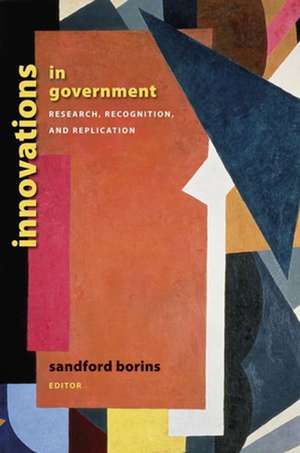Innovations in Government: Research, Recognition, and Replication: Brookings / Ash Center Series, "Innovative Governance in the 21st Century"
Editat de Sandford F. Borinsen Limba Engleză Paperback – 28 feb 2008
The Innovations in American Government Awards Program began in 1985 with a grant from the Ford Foundation to the Kennedy School of Government at Harvard to conduct a program of awards for innovations in state and local government. The foundation's objective was ambitious and, in an era of "government is the problem" rhetoric, determinedly proactive. It sought to counter declining public confidence in government by highlighting innovative and effective programs. Over twenty years later, research, recognition, and replication are the source of the program's continuing influence and its vitality. What is the future of government innovation? How can innovation enhance the quality of life for citizens and strengthen democratic governance? Innovations in Government: Research, Recognition, and Replication answers these questions by presenting a comprehensive approach to advancing the practice and study of innovation in government. The authors discuss new research on innovation, explore the impact of several programs that recognize innovation, and consider challenges to the replication of innovations. Contributors include Eugene Bardach (University of California– Berkeley), Robert Behn (Harvard University), John D. Donahue (Harvard University), Marta Ferreira Santos Farah (Center for Public Administration and Government, Fundação Getulio Vargas), Archon Fung (Harvard University), Jean Hartley (University of Warwick), Steven Kelman (Harvard University), Gowher Rizvi (Ash Institute for Democratic Governance and Innovation, Harvard University), Peter Spink (Center for Public Administration and Government, Fundação Getulio Vargas), and Jonathan Walters (Governing).
Preț: 207.04 lei
Nou
Puncte Express: 311
Preț estimativ în valută:
39.62€ • 41.47$ • 32.97£
39.62€ • 41.47$ • 32.97£
Carte tipărită la comandă
Livrare economică 31 martie-14 aprilie
Preluare comenzi: 021 569.72.76
Specificații
ISBN-13: 9780815713777
ISBN-10: 0815713770
Pagini: 231
Dimensiuni: 152 x 229 x 16 mm
Greutate: 0.36 kg
Editura: Brookings Institution Press
Colecția Brookings Institution Press/Ash Center
Seria Brookings / Ash Center Series, "Innovative Governance in the 21st Century"
ISBN-10: 0815713770
Pagini: 231
Dimensiuni: 152 x 229 x 16 mm
Greutate: 0.36 kg
Editura: Brookings Institution Press
Colecția Brookings Institution Press/Ash Center
Seria Brookings / Ash Center Series, "Innovative Governance in the 21st Century"
Notă biografică
Edited by Sandford F. Borins
Descriere
A Brookings Institution Press and Ash Center for Democratic Governance and Innovation publication
The Innovations in American Government Awards Program began in 1985 with a grant from the Ford Foundation to the Kennedy School of Government at Harvard to conduct a program of awards for innovations in state and local government. The foundation's objective was ambitious and, in an era of "government is the problem" rhetoric, determinedly proactive. It sought to counter declining public confidence in government by highlighting innovative and effective programs. Over twenty years later, research, recognition, and replication are the source of the program's continuing influence and its vitality.
What is the future of government innovation? How can innovation enhance the quality of life for citizens and strengthen democratic governance? Innovations in Government: Research, Recognition, and Replication answers these questions by presenting a comprehensive approach to advancing the practice and study of innovation in government. The authors discuss new research on innovation, explore the impact of several programs that recognize innovation, and consider challenges to the replication of innovations.
Contributors include Eugene Bardach (University of California–Berkeley), Robert Behn (Harvard University), John D. Donahue (Harvard University), Marta Ferreira Santos Farah (Center for Public Administration and Government, Fundação Getulio Vargas), Archon Fung (Harvard University), Jean Hartley (University of Warwick), Steven Kelman (Harvard University), Gowher Rizvi (Ash Institute for Democratic Governance and Innovation, Harvard University), Peter Spink (Center for Public Administration and Government, Fundação Getulio Vargas), and Jonathan Walters (Governing).
The Innovations in American Government Awards Program began in 1985 with a grant from the Ford Foundation to the Kennedy School of Government at Harvard to conduct a program of awards for innovations in state and local government. The foundation's objective was ambitious and, in an era of "government is the problem" rhetoric, determinedly proactive. It sought to counter declining public confidence in government by highlighting innovative and effective programs. Over twenty years later, research, recognition, and replication are the source of the program's continuing influence and its vitality.
What is the future of government innovation? How can innovation enhance the quality of life for citizens and strengthen democratic governance? Innovations in Government: Research, Recognition, and Replication answers these questions by presenting a comprehensive approach to advancing the practice and study of innovation in government. The authors discuss new research on innovation, explore the impact of several programs that recognize innovation, and consider challenges to the replication of innovations.
Contributors include Eugene Bardach (University of California–Berkeley), Robert Behn (Harvard University), John D. Donahue (Harvard University), Marta Ferreira Santos Farah (Center for Public Administration and Government, Fundação Getulio Vargas), Archon Fung (Harvard University), Jean Hartley (University of Warwick), Steven Kelman (Harvard University), Gowher Rizvi (Ash Institute for Democratic Governance and Innovation, Harvard University), Peter Spink (Center for Public Administration and Government, Fundação Getulio Vargas), and Jonathan Walters (Governing).





























